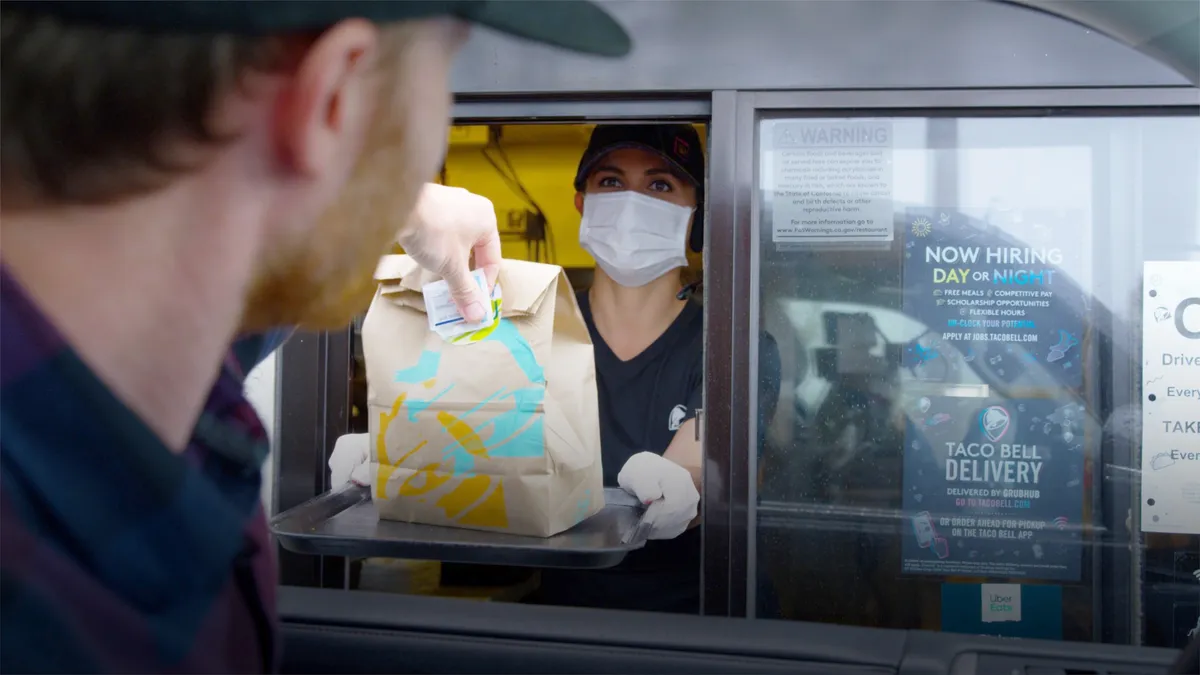Dive Brief:
- One Fair Wage announced a new $1 million "Wages Can’t Wait — Service Worker Action and Relief Fund" Thursday that will pay eligible workers to stay in the restaurant industry and push for higher wages, according to a press release emailed to Restaurant Dive. The fund is earmarked for grants of up to $1,200 for restaurant workers who have either recently walked off their jobs or are thinking about leaving.
- A OFW report from May shows that 53% of all workers are considering leaving their restaurant jobs, with most of them citing low wages and tips as a main reason for departing. This coincides with a July report from Joblist that shows nearly 40% of former hospitality workers won't consider a hospitality job for their next position.
- With this fund, OFW takes a firm position that low wages are to blame for the labor pressures restaurants are facing right now. Many restaurants, however, have claimed that extended unemployment benefits are the cause of the hospitality labor shortage.
Dive Insight:
The fight for higher restaurant wages has been exacerbated by the pandemic, but it isn't new. Employees have been calling for wage hikes since the Fight For $15 Movement organized in 2012 — three years after the current federal minimum wage of $7.25 went into place. One Fair Wage was founded in 2013.
Some of these organizations' advocacy efforts are paying off. Currently, 29 states and Washington, D.C. have minimum wages above the federal limit, while several chains — including Starbucks, Chipotle and McDonald's — have committed to higher wages in a bid to hire new workers and retain existing employees. The Washington Post reports that the past three months have marked some of the fastest wage growth since the early 1980s, and that average pay in the restaurant industry in May was above $15 an hour for the first time.
But restaurants are still struggling to keep their operations fully staffed.
Twenty-five states have ended federal unemployment benefits three months early in a bid to rectify labor shortages. An analysis from Indeed found that there was a 5% increase in job search activity after the benefits ended in most states, but that increase only lasted about a week. Interestingly, job search activity hasn't exactly grown in 12 states that no longer have enhanced benefits, according to Indeed data. Because of this, labor economists have said it's too soon to tell if ending the benefits early has helped fill more positions, and unemployment claims increased in the week ending July 3.
Restaurant workers have made it clear that pay isn't the only issue at play when they consider leaving, however. The restaurant industry has proven to be risky throughout the past year and a half, with 44% of foodservice workers in Los Angeles County reporting that one or more of their coworkers had contracted COVID-19, for example.
On top of this health risk, 78% of restaurant workers report to have experienced or witnessed hostile behavior in response to COVID-19 protocols. These issues come amid a disproportionately high sexual harassment rate in the industry. All of these problems have created a perfect storm for workers to reconsider the industry after more than a year of pandemic-induced challenges.
"The restaurant industry doesn't have a worker shortage — it has a wage shortage. Tens of thousands of restaurant workers do not want to go back to work to earn poverty wages putting their lives on the line," OFW President Saru Jayaraman said in an emailed statement.
OFW's relief efforts may not be enough incentive to keep restaurant workers on the job, either. Most quick-service crew members work 20 to 29 hours a week, equating to about $210 a week at most on the federal minimum wage. A $1,200 grant could buy months of time for restaurant worker still earning the minimum wage, or even slightly above that limit, but beleaguered workers may still opt for the security of a more stable sector.











